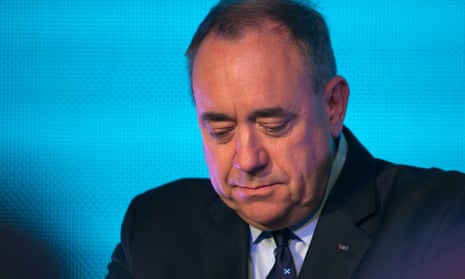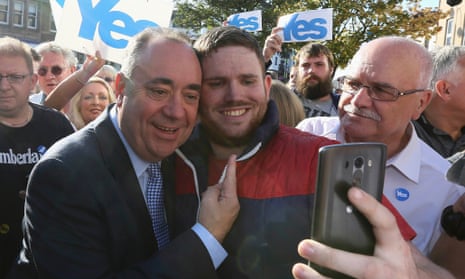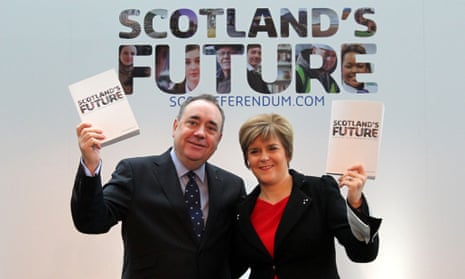And that’s it for our referendum results day live blog. I merely helped out at the end, but congratulation on an epic effort to Claire Phipps, Andrew Sparrow and Paul Owen. And thank you all for reading.
Alex Salmond to resign as first minister after Scotland rejects independence – live
Rolling coverage as Scotland’s longest-serving first minister says he will step down following no vote in independence referendum
Fri 19 Sep 2014 13.46 EDT
First published on Fri 19 Sep 2014 02.38 EDT- The Queen responds to the referendum result
- Salmond resigns: reaction
- Nicola Sturgeon statement: 'the finest first minister Scotland has had'
- Alex Salmond resigns: full statement
- Alex Salmond resigns
- Alex Salmond press conference
- Why did the polls get it wrong?
- Lunchtime summary
- Six arrests during referendum period
- Owen Paterson says Tories should not protect Barnett formula
- Ed Miliband's statement on the referendum result
- Hague says Tories will make "English votes for English laws" election issue
- Ed Miliband's statement
- Farage calls for constitutional convention
- 84.5% turnout sets a UK record
- Scotland votes no

Live feed
- The Queen responds to the referendum result
- Salmond resigns: reaction
- Nicola Sturgeon statement: 'the finest first minister Scotland has had'
- Alex Salmond resigns: full statement
- Alex Salmond resigns
- Alex Salmond press conference
- Why did the polls get it wrong?
- Lunchtime summary
- Six arrests during referendum period
- Owen Paterson says Tories should not protect Barnett formula
- Ed Miliband's statement on the referendum result
- Hague says Tories will make "English votes for English laws" election issue
- Ed Miliband's statement
- Farage calls for constitutional convention
- 84.5% turnout sets a UK record
- Scotland votes no
BBC witness: Yes and no campaigners are chanting slogans in George Square in Glasgow. A few firecrackers have been set off by both sides.
— Daniel Sandford (@BBCDanielS) September 19, 2014
This from the BBC – it seems some feelings are running high in Glasgow.
#BREAKING Spain's Catalan parliament approves independence vote law
— Agence France-Presse (@AFP) September 19, 2014
As one independence bid fails, another resumes.
The Queen responds to the referendum result
The Queen has put out a rare personal statement, sent from Balmoral:
After many months of discussion, debate, and careful thought, we now know the outcome of the referendum, and it is a result that all of us throughout the United Kingdom will respect.
For many in Scotland and elsewhere today, there will be strong feelings and contrasting emotions – among family, friends and neighbours. That, of course, is the nature of the robust democratic tradition we enjoy in this country. But I have no doubt that these emotions will be tempered by an understanding of the feelings of others.
Now, as we move forward, we should remember that despite the range of views that have been expressed, we have in common an enduring love of Scotland, which is one of the things that helps to unite us all. Knowing the people of Scotland as I do, I have no doubt that Scots, like others throughout the United Kingdom, are able to express strongly-held opinions before coming together again in a spirit of mutual respect and support, to work constructively for the future of Scotland and indeed all parts of this country.
My family and I will do all we can to help and support you in this important task.
ELIZABETH R.
As is ever the way in politics, Alex Salmond’s decision to stand down has brought a flood of glowing tributes from his fiercest political enemies.
David Cameron:
Alex is a politician of huge talent and passion. He has been an effective first minister and always fights his corner. While we disagree profoundly about his goal of a separated Scotland, and many other things, I respect and admire his huge contribution to politics and public life.
Alistair Darling:
Alex Salmond is a formidable political figure. He transformed the SNP into a party of government and delivered their referendum on independence which they had craved so long. Today he has accepted Scotland’s verdict, recognising that it is for others in his party to take the SNP forward.
He has rightly said that the referendum was a once-in-a-lifetime event and that we all need to work to bring Scotland together.
He can look back with pride on being the longest-serving first minister and to the huge contribution he has made to public life in Scotland. I wish him well in the future.
Libby Brooks has penned a quick story on the seemingly likely succession of Nicola Sturgeon, which will be up soon. Here’s a taster:
Alex Salmond’s shock resignation leaves the way open for 44-year-old Nicola Sturgeon, the woman whom many already believed was destined to become the first female leader of the Scottish government.
The only bar to an orderly transition – Holyrood health minister Alex Neill and Westminster MP Angus Robertson have already been mentioned as potential challengers – would be the SNP’s resistance to anointment, but for a party that has been so disciplined throughout the referendum campaign it is unlikely that this will trump the desire for unity, especially while there is a further devolution deal to be hammered out.
Last night’s results, which saw significant successes for the yes campaign in the west central belt, mark a shift in the geographical centre of the SNP, one party insider suggests, and Sturgeon’s base in Glasgow’s south side puts her in a strong position to rebuild from there. Sturgeon makes no secret of being to the left of Salmond, and a similar shift in the political centre of gravity of the SNP is expected.
The two-year referendum campaign has seen Sturgeon grow in stature. Aside from Salmond himself, she was the most visible politician on the yes side, and the most visible woman: one criticism of an otherwise faultless and highly organised campaign is that she failed to close the gap in support for independence among female voters.
Travelling all across Scotland over the summer to speak to local supporters and undecided voters, Sturgeon worked phenomenally hard. She connected with ordinary Scots in a way that some suggest Salmond did not. One observer believes that, in the first televised debate when he flailed against Alistair Darling, Salmond was not “battle ready” in the way that Sturgeon would have been, having answered such questions from voters every night of the week.
That’s it from me (@Claire_Phipps) for the day – with a hugely appreciative nod to my colleagues Andrew Sparrow and Paul Owen, who were liveblogging the early stint.
I’m handing over this liveblog now to Peter Walker, who will scoop up further reaction to Alex Salmond’s resignation.
Thanks for reading, and for all your comments and tweets in these referendum blogs.
Salmond resigns: reaction
Salmond’s fellow party leaders in Scotland have been responding to his decision to step down as SNP leader and first minister. Patrick Harvie, co-convenor of the Scottish Green party, who campaigned with him for a yes vote, tweeted this:
It's no secret that I've not always agreed with Alex Salmond. But none can doubt the impact he's had or the commitment he's shown. Respect.
— Patrick Harvie (@patrickharvie) September 19, 2014
Ruth Davidson, the Scottish Conservative leader, took issue with Salmond’s parting shot accusing Tory leader David Cameron of reneging on a deal to push through new powers for Scotland:
The FM has served Scotland & I wish him well, but he seems confused by the timetable promised. Here it is. pic.twitter.com/egI8mSMrxq"
— Ruth Davidson MSP (@RuthDavidsonMSP) September 19, 2014
Ed Miliband has called Salmond a “formidable politician” who always stood up for what he believed in.
Ewen MacAskill sends further thoughts on the decision by Alex Salmond to step down:
When I travelled with Salmond on the campaign trail on the eve of the poll, hurtling across the Ayrshire countryside and the small, struggling villages, pebble-dash former council estates, I asked him if he was planning to stay in office until 2016, and would he stand down then? In an otherwise friendly 30-minute interview, he became touchy, eventually saying, in relation to his post-2016 plans: ‘Don’t go there.’
Salmond has left the party leadership before, in 2000, only to make a surprise return – a shock for some of his rivals in the party – in 2004. Then, he did not think the man who had succeeded him, John Swinney, was up to the task, and the party risked going backwards. He has no such fears with Nicola Sturgeon.
He is giving her plenty of time to ensure a smooth transition before the 2015 Westminster election and for the 2016 Scottish parliamentary elections, and possibly the UK referendum on Europe in 2017. If there was to be a Conservative government at Westminster and an exit from Europe, she could at the very least ponder whether the time was right for another independence referendum or she could decide to wait a few more years until she is as sure as she can be the support is finally there for independence.
On the campaign trail, Salmond ruled out another referendum for a generation, roughly 20 years. Tellingly, though, on the Andy Marr show last weekend, he added a vital rider: that this was his view, meaning his successor would not be bound by it.

Nicola Sturgeon statement: 'the finest first minister Scotland has had'
Here is the full statement from Nicola Sturgeon in response to news that Alex Salmond is to resign. Sturgeon says she can think of “no greater privilege” than to succeed him as SNP leader and first minister, but that the decision “is not for today”:
Alex Salmond’s achievements as SNP leader and Scotland’s first minister are second to none. He led the SNP into government and has given our country a renewed self-confidence. Through policies such as the council tax freeze, free prescriptions and the scrapping of tuition fees, he has made a real difference for hundreds of thousands of Scots. And yesterday he inspired 1.6 million of our fellow citizens to vote Yes to independence.
The personal debt of gratitude I owe Alex is immeasurable. He has been my friend, mentor and colleague for more than 20 years. Quite simply, I would not have been able to do what I have in politics without his constant advice, guidance and support through all these years.
Alex’s announcement today inevitably raises the question of whether I will be a candidate to succeed him as SNP leader. I can think of no greater privilege than to seek to lead the party I joined when I was just 16. However, that decision is not for today. My priority this weekend, after a long and hard campaign, is to get some rest and spend time with my family. I also want the focus over the next few days to be on the outstanding record and achievements of the finest first minister Scotland has had.
Nicola Sturgeon, Salmond’s likely successor as SNP leader and first minister, has released this statement on what she calls “the finest first minister Scotland has had”:
My statement on @alexsalmond announcement. A tribute to the finest First Minister Scotland has had. https://t.co/ioAQIBplM7
— Nicola Sturgeon (@NicolaSturgeon) September 19, 2014
Asked by the BBC’s Kirsty Wark what – given he is “not an old man” – he is going to do next, Salmond said: “I am not going to withdraw entirely from political life.”
He would put himself forward in elections and continue in politics, he said. “You don’t have to be leader of the SNP or first minister to contribute to the political process.”
The SNP had, he said, “the strongest leadership team” in Scottish politics. “It’s right and proper that these people are given an opportunity.”
My colleague Ewen MacAskill sends this first-thoughts analysis of the news that Alex Salmond is to step down as first minister and SNP leader:
Scotland’s deputy first minister Nicola Sturgeon is as certain as it is possible to be to take over from Alex Salmond, first as leader of the Scottish National party (SNP) and then at the head of the government.
It will be a coronation, not a contest. There are no other serious candidates ready to challenge her. At best, someone might stand just to give the appearance of a contest, but she would still win.
Why is Salmond going now? He has been saying for weeks when asked if he planned to resign in the event of losing the referendum vote, he would complete his term as first minister, which would take him to the next Scottish election in 2016.
So why now? He may already have had a deal in place with Sturgeon depending on the referendum result. He may have judged, as he suggested in his resignation speech, that she is capable of reaching the parts of the electorate immune to his charms, primarily women, and also someone younger to consolidate and build on the enthusiasm of all those new young recruits.

And here is the official tweet (because that’s what we do now) from Alex Salmond:
A statement from @AlexSalmond http://t.co/RcCm5xNqdd pic.twitter.com/vzbXkqsS3U
— Alex Salmond (@AlexSalmond) September 19, 2014
Salmond's Chief of Staff Geoff Aberdein in tears at back of room. #indyref
— Joe Pike (@joepike) September 19, 2014
Comments (…)
Sign in or create your Guardian account to join the discussion